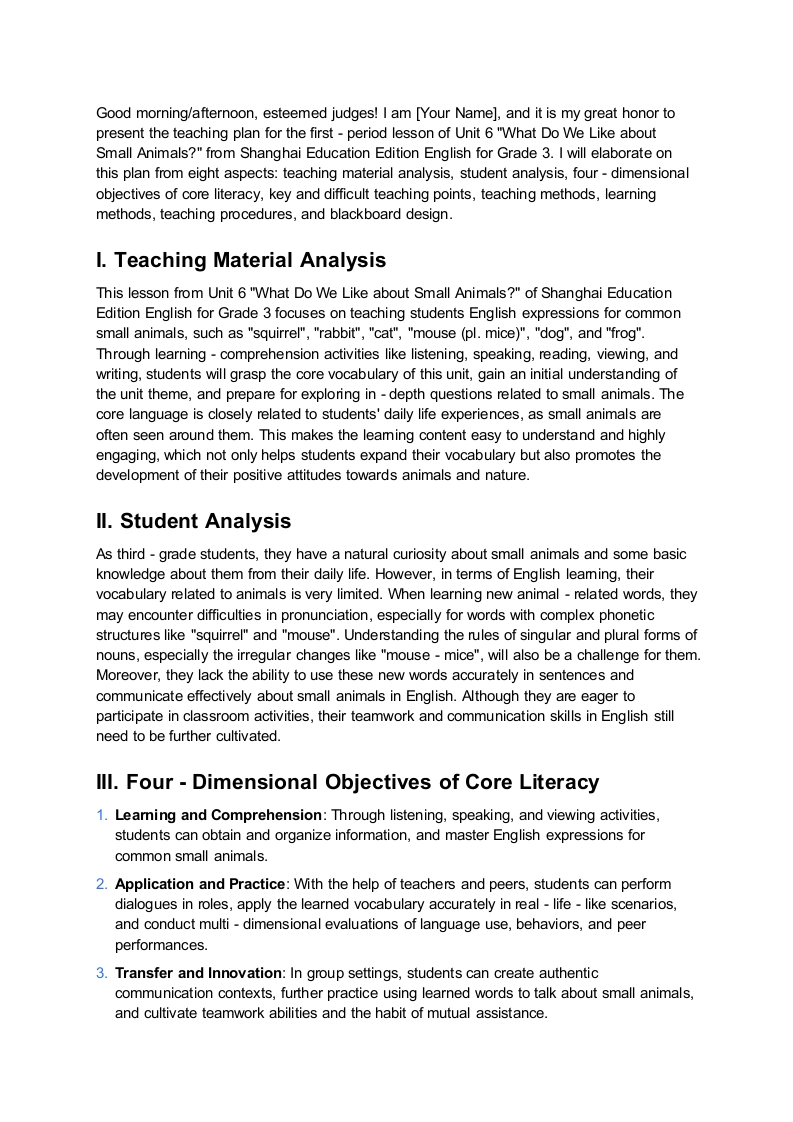

第1页 / 共5页
试读已结束,还剩4页,您可下载完整版后进行离线阅读
© 版权声明
文章版权归作者所有,未经允许请勿转载。
THE END
Good morning/afternoon,esteemed judges!I am [Your Name],and it is my great honor topresent the teaching plan for the first-period lesson of Unit 6 "What Do We Like aboutSmall Animals?"from Shanghai Education Edition English for Grade 3.I will elaborate onthis plan from eight aspects:teaching material analysis,student analysis,four-dimensionalobjectives of core literacy,key and difficult teaching points,teaching methods,learningmethods,teaching procedures,and blackboard design.I.Teaching Material AnalysisThis lesson from Unit 6 "What Do We Like about Small Animals?"of Shanghai EducationEdition English for Grade 3 focuses on teaching students English expressions for commonsmall animals,such as "squirrel","rabbit","cat","mouse (pl.mice)","dog",and "frog".Through learning -comprehension activities like listening,speaking,reading,viewing,andwriting,students will grasp the core vocabulary of this unit,gain an initial understanding ofthe unit theme,and prepare for exploring in-depth questions related to small animals.Thecore language is closely related to students'daily life experiences,as small animals areoften seen around them.This makes the leaming content easy to understand and highlyengaging,which not only helps students expand their vocabulary but also promotes thedevelopment of their positive attitudes towards animals and nature.ll.Student AnalysisAs third-grade students,they have a natural curiosity about small animals and some basicknowledge about them from their daily life.However,in terms of English leaming,theirvocabulary related to animals is very limited.When learning new animal-related words,theymay encounter difficulties in pronunciation,especially for words with complex phoneticstructures like "squirrel"and "mouse".Understanding the rules of singular and plural forms ofnouns,especially the irregular changes like "mouse -mice",will also be a challenge for them.Moreover,they lack the ability to use these new words accurately in sentences andcommunicate effectively about small animals in English.Although they are eager toparticipate in classroom activities,their teamwork and communication skills in English stillneed to be further cultivated.Ill.Four -Dimensional Objectives of Core Literacy1.Leaming and Comprehension:Through listening,speaking,and viewing activities,students can obtain and organize information,and master English expressions forcommon small animals.2.Application and Practice:With the help of teachers and peers,students can performdialogues in roles,apply the learned vocabulary accurately in real-life-like scenarios,and conduct multi-dimensional evaluations of language use,behaviors,and peerperformances.3.Transfer and Innovation:In group settings,students can create authenticcommunication contexts,further practice using learned words to talk about small animals,and cultivate teamwork abilities and the habit of mutual assistance.


暂无评论内容